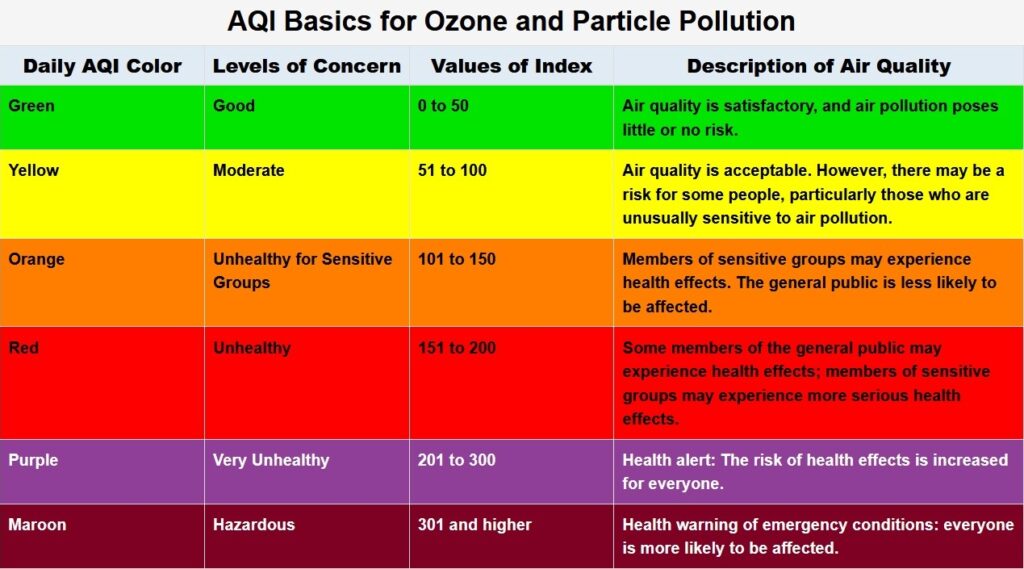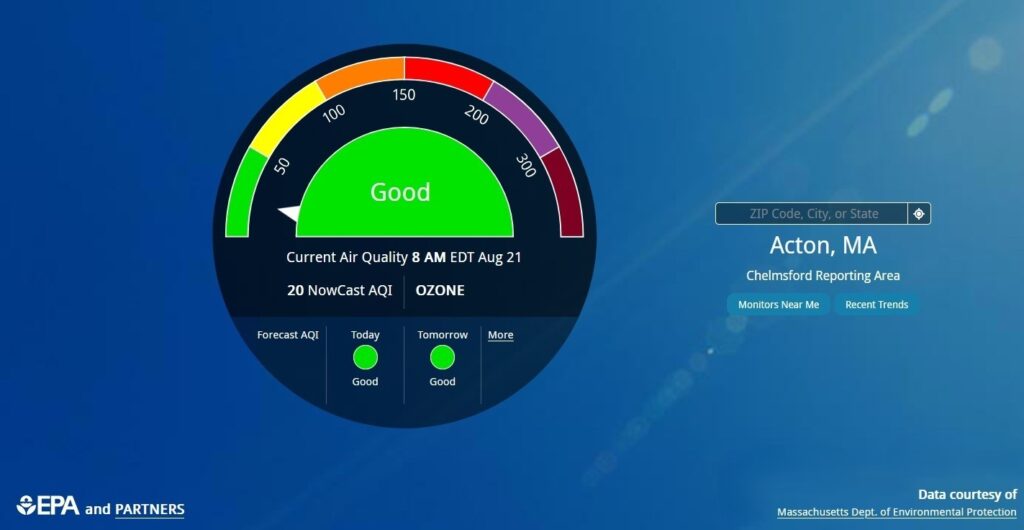This summer, Acton residents saw hazy skies overhead — but the smoke wasn’t from any local source. It had traveled hundreds of miles, carried on the winds from record-setting wildfires in Canada. What was once a rare event is quickly becoming a regular part of New England summers.
Local experts say both climate change and shifting weather patterns are playing a role in these smoky days that are affecting the health of people right here in Acton.
Meteorologist Christopher Gloninger, Senior Climate Scientist with Woods Hole Group, who has tracked the smoke patterns across the region explained that “abnormally dry conditions and heat are helping fuel the fires across Canada. To date this is their second most significant fire season on record with regards to acreage burned.” He noted that research shows this summer’s heat was “up to five times more likely because of human-caused climate change.”
The heat dries out vegetation and accelerates evaporation, creating tinderbox conditions. “Even if a region experiences a wet spring, high temperatures can evaporate this moisture. That new growth quickly turns into fire fuel,” Gloninger said.
Once these massive fires burn, the smoke doesn’t stay local. It hitches a ride on the jet stream. With Arctic ice retreating, researchers are also seeing changes to the jet stream itself. Gloninger noted that “when there is less temperature differential between the arctic and midlatitudes, that can cause these dips in the jet stream.” These dips increase the likelihood that smoke plumes reach New England.
For residents of Acton, this means wildfire smoke in the summer is no longer an oddity. “What was a rare occurrence is becoming a semi-regular event,” Gloninger said. In fact, 2023 marked Canada’s worst fire season on record, and in each of the past three years, smoke from those Canadian fires has affected air quality in Acton to varying degrees.
While the haze may look harmless, public health officials stress that the risks are real — especially for vulnerable groups. “Residents who suffer from respiratory diseases like asthma or COPD can experience exacerbations or worsening of their symptoms on days with poor air quality,” said Acton Public Health Nurse Susan Sama. “It’s important for residents to stay up to date on local air quality information and alerts.”

The Massachusetts Department of Public Health directs residents to the EPA’s AirNow website which offers real-time updates on air quality and wildfire smoke forecasts. Residents can also sign up for email or text alerts so they can make informed decisions about outdoor activities. Sama emphasized that prevention is key: limit time outdoors, use high-efficiency particulate air (HEPA) filters and air conditioners when possible, and keep a supply of N5 masks on hand in case outdoor exposure is unavoidable.

Although Acton does not currently track local ER visits tied specifically to poor air quality events, Sama noted that “we realize residents do seek more care for respiratory issues at local ERs and urgent care clinics during poor air quality events.”
The Board of Health also works with schools, nursing homes, and outdoor workers to ensure protective measures are in place. Their guidance follows the standard Air Quality Alert recommendations: limiting outdoor activity, moving events indoors when necessary, and prioritizing care for those most at risk. To raise awareness, the Acton Health Division publishes outdoor air quality updates and educational posts on the town’s website and local media channels, including the official Facebook (@ActonMAGov), and Instagram (@actonmagov) accounts.
Preparation is also built into the town’s emergency planning. Acton’s emergency preparedness team, led by Fire Chief Anita Arnum, has incorporated air quality concerns into its response framework. Vulnerable residents, particularly seniors and children, are encouraged to keep an adequate supply of medications on hand and to follow action plans provided by their healthcare providers. Some may benefit from tracking their lung function with peak flow meters to catch flare-ups early.
For residents unable to afford air purifiers or those living in housing with poor ventilation, the town has designated several public buildings as cooling and clean-air stations. These locations, listed below, provide safe, air-conditioned environments where residents can protect themselves during poor air quality days.
- Acton Memorial Library: 486 Main Street. Times vary. See the Library website.
- Health and Human Services Center: 30 Sudbury Road (Mondays 8 a.m.-4 p.m., Tuesdays 8 a.m.-6 p.m., Wed. and Thurs. 8 a.m.-4 p.m., and Fri. 8 a.m.-noon).
- Public Safety Facility: 371 Main Street (24 hours per day).
Sama said she is especially concerned about long-term health risks for children and seniors. Even those without diagnosed respiratory conditions can be affected by repeated smoke exposure. “Prevention measures — limiting outdoor time, using air conditioning and HEPA filters, and monitoring symptoms — should be used by all at-risk residents, even if they don’t already suffer from respiratory issues,” she said.
With Canadian wildfire smoke expected to become a recurring summer challenge, Gloninger underscored the importance of being prepared. “We can expect stretches during the summer when the sunlight is dimmer from smoke aloft, and sometimes that smoke may drop down to the surface, creating bad air quality,” he said.
For Acton, that means staying informed, protecting vulnerable groups, and adapting community resources. As Sama put it, “The best way to safeguard health is to plan ahead.”
Data on Canadian Fires: https://cwfis.cfs.nrcan.gc.ca/ha/nfdb.
Susan Greene is an environmental science consultant, sustainability blogger, and grant writer based in Acton, MA. She is the founder of GreeneUP, a platform that explores sustainable living, climate issues, and community resilience.












